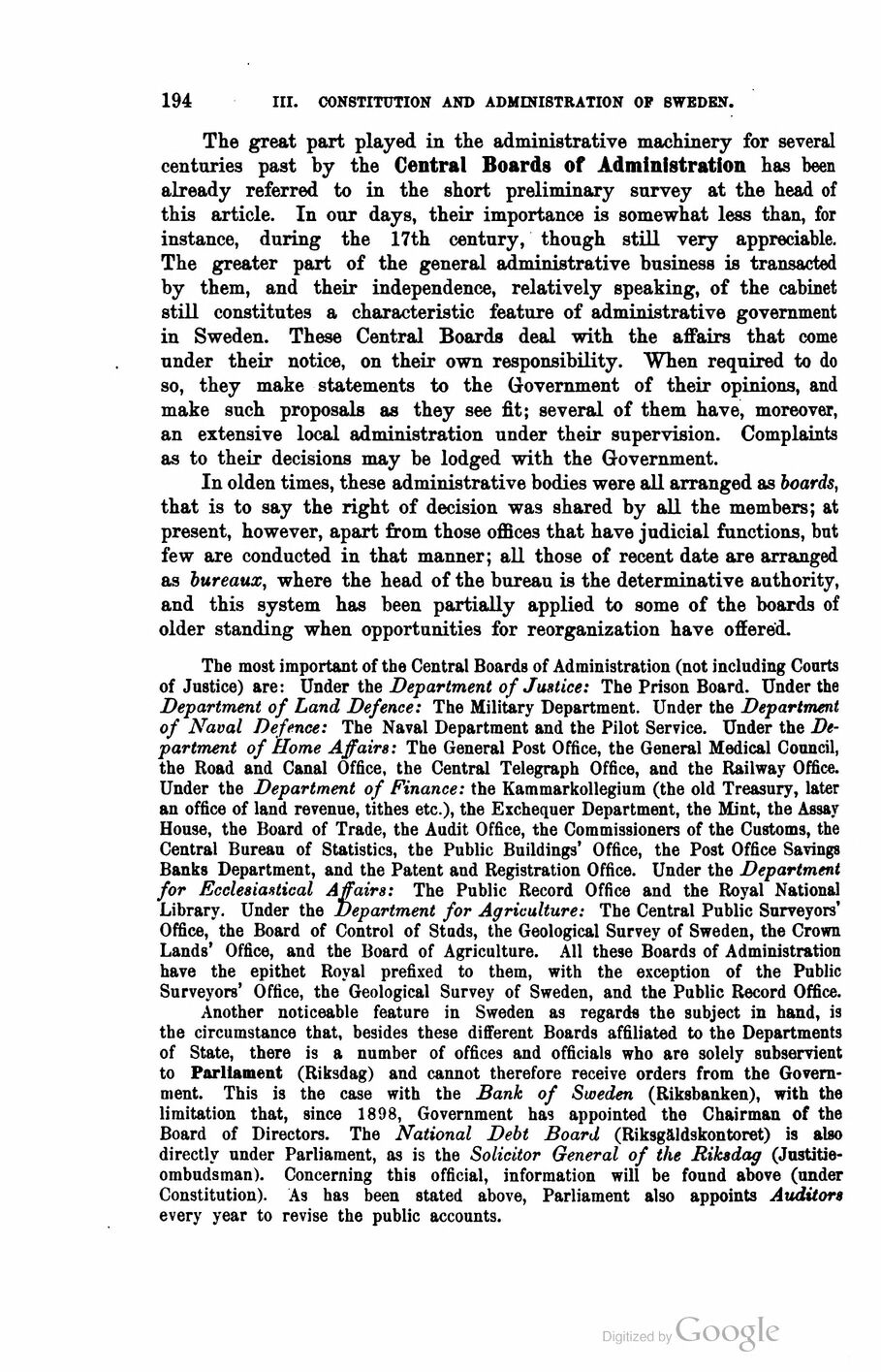
Full resolution (JPEG) - On this page / på denna sida - First part - III. Constitution and Administration - 2. State Administration - Historical Account and the present State Administration in general, by E. Söderberg, Ph. D., First Actuary at the Royal Central Bureau of Statistics, Stockholm

<< prev. page << föreg. sida << >> nästa sida >> next page >>
Below is the raw OCR text
from the above scanned image.
Do you see an error? Proofread the page now!
Här nedan syns maskintolkade texten från faksimilbilden ovan.
Ser du något fel? Korrekturläs sidan nu!
This page has never been proofread. / Denna sida har aldrig korrekturlästs.
194
III. CONSTITUTION AND ADMINISTRATION Of SWEDEN.
The great part played in the administrative machinery for several
centuries past by the Central Boards of Administration has been
already referred to in the short preliminary survey at the head of
this article. In our days, their importance is somewhat less than, for
instance, during the 17th century, though still very appreciable.
The greater part of the general administrative business is transacted
by them, and their independence, relatively speaking, of the cabinet
still constitutes a characteristic feature of administrative government
in Sweden. These Central Boards deal with the affairs that come
under their notice, on their own responsibility. "When required to do
so, they make statements to the Government of their opinions, and
make such proposals as they see fit; several of them have, moreover,
an extensive local administration under their supervision. Complaints
as to their decisions may be lodged with the Government.
In olden times, these administrative bodies were all arranged as boards,
that is to say the right of decision was shared by all the members; at
present, however, apart from those offices that have judicial functions, bnt
few are conducted in that manner; all those of recent date are arranged
as bureaux, where the head of the bureau is the determinative authority,
and this system has been partially applied to some of the boards of
older standing when opportunities for reorganization have offered.
The most important of the Central Boards of Administration (not including Courts
of Justice) are: Under the Department of Justice: The Prison Board. Under the
Department of Land Defence: The Military Department. Under the Department
of Naval Defence: The Naval Department and the Pilot Service. Under the
Department of Home Affairs: The General Post Office, the General Medical Council,
the Road and Canal Office, the Central Telegraph Office, and the Railway Office.
Under the Department of Finance: the Kammarkollegium (the old Treasury, later
an office of land revenue, tithes etc.), the Exchequer Department, the Mint, the Assay
House, the Board of Trade, the Audit Office, the Commissioners of the Customs, the
Central Bureau of Statistics, the Public Buildings’ Office, the Post Office Savings
Banks Department, and the Patent and Registration Office. Under the Department
for Ecclesiastical Affairs: The Public Record Office and the Royal National
Library. Under the Department for Agriculture: The Central Public Surveyors’
Office, the Board of Control of Studs, the Geological Survey of Sweden, the Crown
Lands’ Office, and the Board of Agriculture. All these Boards of Administration
have the epithet Royal prefixed to them, with the exception of the Public
Surveyors’ Office, the Geological Survey of Sweden, and the Public Record Office.
Another noticeable feature in Sweden as regards the subject in hand, is
the circumstance that, besides these different Boards affiliated to the Departments
of State, there is a number of offices and officials who are solely subservient
to Parliament (Riksdag) and cannot therefore receive orders from the
Government. This is the case with the Bank of Sweden (Riksbanken), with the
limitation that, since 1898, Government has appointed the Chairman of the
Board of Directors. The National Debt Board (Riksgäldskontoret) is also
directly under Parliament, as is the Solicitor General of the Riksdag
(Justitieombudsman). Concerning this official, information will be found above (under
Constitution). As has been stated above, Parliament also appoints Auditors
every year to revise the public accounts.
<< prev. page << föreg. sida << >> nästa sida >> next page >>